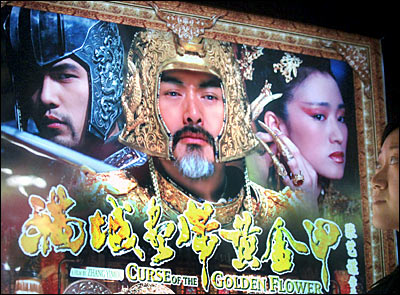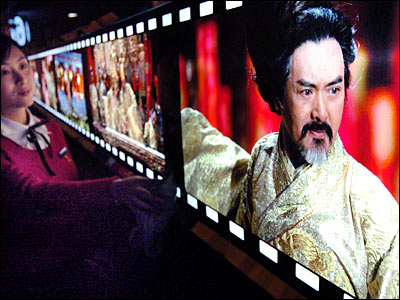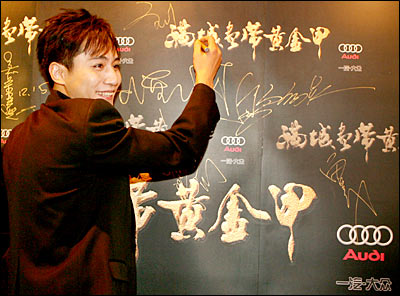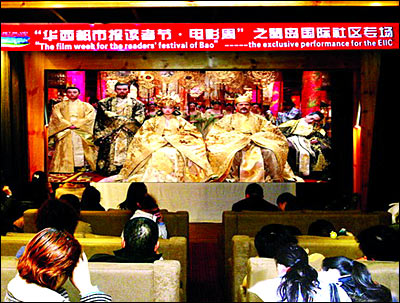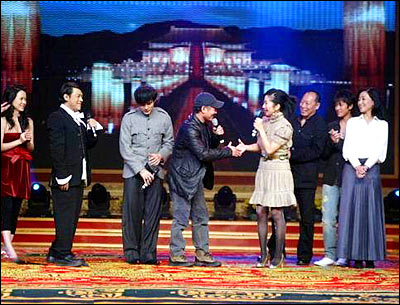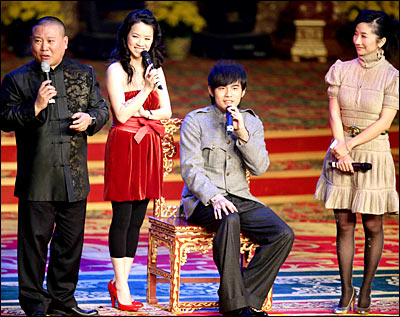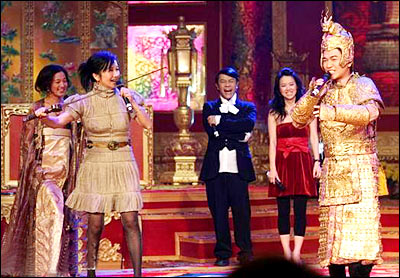| Home / Entertainment / News | Tools: Save | Print | E-mail | Most Read |
| Curse of the Golden Flower Last of a Generation? |
| Adjust font size: |
Chinese blockbuster Curse of the Golden Flower premiered nationwide yesterday. Hopefully it will be the last example of current Chinese-style films made of huge money, stunning and shining colors, CGI, costume and weak storyline. Whether the so-called A promotion gala for the film was held last night. Producers poured over 50 million yuan (US$6.4 million) into Thursday's ceremony and expanded the film's royal palace to accommodate over thousand guests to the so-called worldwide premiere, though its first run of premieres will be limited to However, the gala was pathetic despite the money when the film's main creators were absent. Zhang Yimou did not show up, due to his engagement in directing opera The First Emperor for the Metropolitan Opera in
The film, with both Chinese and English subtitles, will run for a month in Film producer and Beijing New Picture Chairman Zhang Weiping believed the film would earn 300 million yuan (US$38.3 million) from the domestic box office, breaking the 250 million yuan (US$31.9 million) record set by Hero. Zhang Yimou, a one-time cameraman, made his fame in the 1980s when he directed a series of powerful films such as Red Sorghum, Ju Dou and Raise the Red Lantern, which earned him international acclaim. He started the big-budget Chinese filmmaking wave in 2002 by making Hero, starring Jet Li and Maggie Cheung, and then reached the peak of his fame when the film was introduced by Quentin Tarantino into the Chen Kaige and Feng Xiaogang tried to follow this route, investing hundreds of millions of yuan into their own film projects, The Promise and The Banquet respectively released in 2005 and 2006, but both were panned. Curse of the Golden Flower finally came. It is adapted from a Chinese classic drama Lei Yu (Thunderstorm) by
Some Chinese movie critics have given this film credit being the best big-budget Chinese commercial film Zhang ever made. But ironically enough, Zhang's wish to please foreign audiences, critics and award committees with his usual stunning colors, vivid photography and traditional Chinese elements fails him this time. For example, Variety critics called it Zhang's "strangest and most troubled film" while Hollywood Reporter said it was a "disappointing misfire from a great director." The latest news may not be what Zhang would like to hear: Curse of the Golden Flower, along with two other Chinese films -- Zhang's another art film Riding Alone for Thousands of Miles in 2005 and Prince of the Himalayas in 2006 by director Hu Xuehua -- received no nominations for the 64th Golden Globes Awards, announced the Hollywood Foreign Press Association yesterday. The annual Golden Globes are considered Hollywood's second most prestigious awards night after the Academy Awards and their results provide a solid forecast for the Oscars. Curse of the Golden Flower was also confronted with controversial attacks from two other films' producers in Still Life, an art film directed by Jia Zhangke, has been awarded the Golden Lion for Best Film at the 63rd Venice Film Festival. It reached Chinese screens yesterday. Jia said previously that he chose the same day as the Golden Flower would sweep Chinese cinema because he wanted to intentionally sacrifice his film and box office. He said this is his Performance Art, since not many people care about a film that can truly touch people's hearts, they only caring about the big-budget films, only showing off their money. "Why I do this is that I actually want to give Chinese audiences an alternative choice," he said a few days ago at a press conference, adding that Zhang Yimou and other Fifth Generation directors lack the skill to make a proper and decent commercial film. Cui Weiping, a professor of
(China.org.cn by Zhang Rui, December 15, 2006) |
| Tools: Save | Print | E-mail | Most Read |
 |
| Related Stories |
